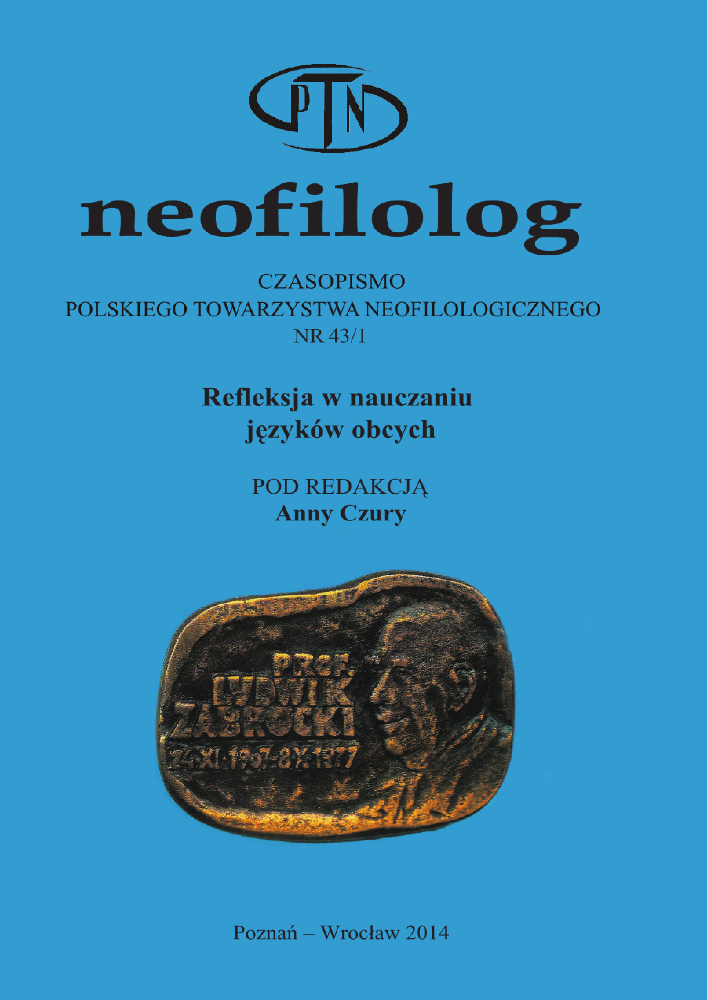Abstract
The goal of the present paper is to question the validity of the claim which sees reflection as an important part of the work of an efficient language teacher. A quasi-experiment was conducted by the author in order to determine whether reflection is a factor which can in some way influence the teacher’s capacity to plan a FL lesson effectively, incorporating new technologies. A reflective thinking questionnaire (RTQ, Kember et al., 2000) was administered to assess the level of reflective thinking in 47 university students. Next, their lesson projects were evaluated by two independent experts. The correlational study seems to show that reflection may indeed be a factor which influences the quality of the work of a foreign language teacher in an important way.Literaturhinweise
Amiri, F. 2000. « IT-literacy for language teachers: should it include computer programming? ». System, No. 28 : 77-84.
Beres, D. L. 2011. « Mobile-assisted language learning from the student perspective: encouraging effective language learning strategies outside of the classroom » (in:) Academic podcasting and mobile assisted language learning: applications and outcomes (éd. B. R. Facer et M. Abdous). Hershey : ISR : 93-110.
Berry, V. 2011. « Jouer pour apprendre : est-ce bien sérieux ? Réflexions théoriques sur les relations entre jeu (vidéo) et apprentissage ». Canadian Journal of Learning and Technology, No. 37 : 1-14.
Dewey, J. 1933. How we Think. New York : Prometheus Books.
Farrell, T. 2012. « Reflecting on reflective rractice : (Re)Visiting Dewey and Schön ». TESOL Journal No. 3 : 7-16.
Ghaye, T. 2011. Teaching and Learning Through Reflective Practice : A Practical Guide for Positive Action. London : David Fulton Press.
Greenwood, A. 1993. « Reflective practice : a critique of the work of Argyris and Schön ». Journal of Advanced Nursing, No. 22 : 226-234.
Huy Phan, P. 2006. « Examination of student learning approaches, reflective thinking, and epistemological beliefs: A latent variables approach ». Electronic Journal of Research in Educational Psychology, No 10: 577-610.
Kember, D., D. Leung, A. Jones et A. Y. Loke. 2000. « Development of a questionnaire to measure the level of reflective thinking ». Assessment and Evaluation in Higher Education No. 25 : 381-395.
King, B. 2013. Bank 3.0 : Why Banking is no Longer Somewhere you Go but Something you Do. New York : Marshall Cavendish.
Kinsella E. A., M.-E. Caty, S. Ng et K. Jenkins. 2012. « Reflective Practice for Allied Health : Theory and Applications » (in:) Adult Education and Health (éd. L. H. English). Toronto : University of Toronto Press : 210-228.
Krajka, J. 2012. The Language Teacher in the Digital Age – Towards a Systematic Approach to Digital Teacher Development. Lublin : Wydawnictwo UMCS.
Kwiatkowska, H. 1997. Edukacja nauczycieli: konteksty – kategorie – praktyki. Warszawa : Instytut Badań Edukacyjnych.
Lucas, U. et P. Leng Tan. 2006. « Assessing levels of reflective thinking: the evaluation of an instrument for use within accounting and business education ». Présentation lors du colloque : Pedagogic Research in Higher Education Conference. Liverpool Hope University, Liverpool.
Moon, J. A. 1999. Reflection in Learning and Professional Development : Theory and Practice. New York : Kogan Page Limited.
Perkowska-Klejman, A. 2012. « Czy twoi studenci są refleksyjni? ». Studia Edukacyjne, No. 21 : 211-232.
Schön, D. A. 1983. The Reflective Practitioner: How Professionals Think in Action. New York : Basic Books.
van Manen, M. 1991. The Tact of Teaching: The Meaning of Pedagogical Thought-fulness. New York : State University of New York Press.
Zawadzka, E. 2004. Nauczyciele języków obcych w dobie przemian. Kraków : Impuls.
Lizenz
Copyright (c) 2019 Neofilolog

Dieses Werk steht unter der Lizenz Creative Commons Namensnennung - Keine Bearbeitungen 4.0 International.
Autoren:
Die Autoren der zur Veröffentlichung in der Zeitschrift Neofilolog angenommenen Texte sind verpflichtet, den Vertrag über die Erteilung einer kostenlosen Lizenz für die Werke mit der Verpflichtung zur Erteilung einer Sublizenz CC auszufüllen, zu unterzeichnen und an die Adresse der Redaktion zurückzusenden.
Gemäß Vertrag erteilen die Autoren auf die in der Zeitschrift Neofilolog veröffentlichten Texte der Adam-Mickiewicz-Universität in Poznań eine nicht exklusive und kostenlose Lizenz und erlauben die Verwendung der Sublizenz Creative Commons Attribution-NoDerivatives 4.0 International (CC BY-ND 4.0).
Die Autoren behalten das Recht zur weiteren freien Verfügung über das Werk.
Benutzer:
Interessierte Onlinebenutzer dürfen die seit 2017 veröffentlichten Werke unter folgenden Bedingungen nutzen:
- Anerkennung der Urheberschaft - die Verpflichtung, zusammen mit dem verbreiteten Werk Informationen über die Urheberschaft, den Titel, die Quelle (Links zum Originalwerk, DOI) und die Lizenz selbst bereitzustellen;
- ohne Schaffung abgeleiteter Werke - das Werk muss in seiner ursprünglichen Form erhalten bleiben, ohne Zustimmung des Autors dürfen keine Studien, beispielsweise Übersetzungen, verbreitet werden.
Die Urheberrechte aller veröffentlichen Texte sind vorbehalten.
Sonstige:
Die Adam-Mickiewicz-Universität in Poznań behält das Recht auf die Zeitschrift als Gesamtheit (Layout, Grafik, Titel, Umschlagsprojekt, Logo usw.).
